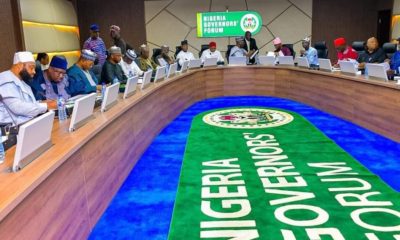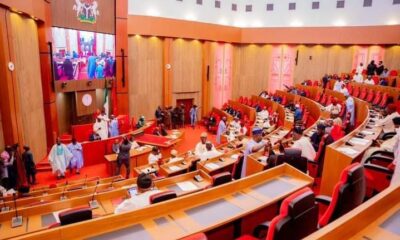NEWS
Tax Bills Will Cripple Northern States’ Ability To Pay Workers – Gov Zulum
Borno State Governor, Babagana Umara Zulum has voiced strong opposition to the tax reform bills currently under review in Nigeria’s National Assembly, arguing that their passage could severely hinder the development of the northern region and exacerbate economic difficulties nationwide.
The tax reform bills, which were presented to the National Assembly by President Bola Ahmed Tinubu in September, have sparked significant backlash, particularly from northern leaders.
Northern governors, traditional rulers, and the Northern Elders Forum have all expressed concern, claiming the reforms do not serve the nation’s interests.
RELATED NEWS: Senate Passes Four Tax Bills For Second Reading
In an interview with BBC Hausa, Governor Zulum criticized the rapid progression of the bills, pointing out that they have received expedited attention in contrast to other pieces of legislation that have taken years to pass.
“We condemn these bills transmitted to the National Assembly. They will drag the north backward,” Zulum stated.
He also highlighted that the negative impact would not be confined to the north but would extend to other regions, including parts of the South West and South East.
The governor also questioned the urgency behind the bills, recalling the protracted timeline for the passage of other significant legislation.
“There’s a petroleum bill that was presented, but it took almost 20 years before it was finally passed. But this one was transmitted and is already receiving legislative attention within a week,” Zulum noted.
He called for a more cautious approach to ensure long-term benefits for future generations.
Zulum warned that the bills could lead to severe fiscal challenges, particularly for northern states, with the potential to hinder their ability to pay civil servants.
“If these bills scale through, we will not be able to even pay salaries. And if we paid, it won’t be sustainable the following year,” he said.
When asked whether the tax reforms would worsen poverty, hunger, and insecurity in the north, the governor answered in the affirmative, stating that the proposals would have detrimental effects on the entire country.
“Yes, including security,” Zulum added. He also pointed out that opposition to the bills is not only coming from the north but also from southern regions such as Lagos, which has voiced similar concerns.
Despite his strong objections, Zulum clarified that his position was not a political attack on President Tinubu, whom he supported in the recent elections.
“This is not against the government. We supported and voted for him. But these bills will not mean good for us,” he said.
The governor also addressed rumors that lawmakers could be influenced by lobbying or kickbacks to support the bills, though he refrained from making direct allegations.
“There are rumors around, but we are not certain. But you know we are in Nigeria!” Zulum said. He urged fellow Nigerians to act with patriotism, emphasizing the importance of considering the welfare of future generations.
In addition, Governor Zulum appealed directly to President Tinubu to reconsider the tax reform bills, urging him to listen to the concerns raised by northern leaders and ensure that any legislation passed benefits the nation as a whole.
“We are appealing to the President to listen to us and address our concerns,” he added
International News
Gabonese Voters Head To Polls In First Presidential Election Since 2023 Coup
Gabonese citizens lined up at polling stations on Saturday to cast their votes in a landmark presidential election, the first since the military ousted the Bongo dynasty in a coup last August.
Eight candidates are vying for the top job, but all signs point to junta leader General Brice Oligui Nguema — the man behind the August 30, 2023, coup — emerging as the frontrunner.
Oligui, who toppled Ali Bongo and ended 55 years of family rule widely criticized for corruption and economic mismanagement, has dominated opinion polls in the run-up to the vote.
In the capital, Libreville, snaking queues formed outside polling stations as voters turned out early.
READ MORE: Gabon Extends Investment Offer To Dangote Amid Nigerian Attacks
Among them was 30-year-old Aurele Ossantanga Mouila, who cast his ballot for the first time after finishing a night shift at a casino.
“I did not have confidence in the earlier regime,” Mouila told reporters, echoing the sentiments of many young voters hoping for change in the oil-rich central African nation.
Oligui, who served as transitional president while civilians drafted a new constitution, swapped his military uniform for campaign attire as he seeks a seven-year mandate.
He faces seven challengers, including his main rival, former Prime Minister Alain-Claude Bilie By Nze, a longtime insider under Ali Bongo who now brands himself as the face of a “complete rupture” from the past.
Despite Oligui’s promises of reform, critics question his commitment to breaking with the old system, noting his deep ties to the Bongo era.
His campaign slogan, “C’BON” — a clever wordplay blending his initials with the French phrase for “It’s good” — has been plastered across Libreville, while rival candidates struggle for visibility.
As roughly 920,000 registered voters cast their ballots, the election is taking place against a backdrop of pressing national issues.
High unemployment, failing infrastructure, regular power outages, and soaring government debt — projected to reach 80 percent of GDP this year — have fueled public frustration.
Analysts, like political observer Neyer Kenga, say the vote represents a critical test for Gabon’s return to civilian rule and constitutional order.
“Today all Gabonese are firmly in favour of a democratic game that is played within the rules,” Kenga noted, adding that the outcome remains uncertain in a nation scarred by post-election violence in 2009 and 2016, as well as last year’s coup.
The interior ministry has pledged a “transparent ballot” and results are expected by Monday. Meanwhile, Oligui remains confident of victory.
“The builder is here, the special candidate, the one you called,” he declared at his final rally, as music and dancing filled the streets of Libreville.
NEWS
‘Hands Off Our Campus!’ — NANS Warns SSANU Over Protest Threats At FUOYE
The National Association of Nigerian Students (NANS), Southwest Zone D, has cautioned the Senior Staff Association of Nigerian Universities (SSANU) against actions capable of disrupting academic activities at the Federal University Oye Ekiti (FUOYE).
In a statement released on Saturday in Ado Ekiti, the student body condemned what it described as “veiled threats” by SSANU Western Zone to mobilize its members for industrial action or protest at FUOYE, following the university’s handling of a sexual harassment allegation against the institution’s Vice Chancellor, Prof. Abayomi Fasina.
The controversy stems from an extraordinary meeting of FUOYE’s Governing Council, which exonerated Prof. Fasina of the sexual misconduct allegation, while two local SSANU leaders were found guilty of misconduct.
READ MORE: NANS Demands Probe Into NYSC’s Non-Payment Of N77,000 Allowance
The council directed the implicated unionists to issue written apologies and undertakings to abide by university regulations within seven days, although their suspensions were lifted, with a forfeiture of half salaries for the period under review.
In reaction, SSANU’s National Vice President for the Western Zone, Abdussobur Salaam, rejected the council’s decision and announced plans to mobilize union members across 26 universities for a possible industrial action until their demands were addressed.
Responding, NANS leaders Taiwo Owolewa (Coordinator), Olutunde Oluwole (General Secretary), and Eromidayo Kuku (Public Relations Officer) warned that any attempt to destabilize the academic environment would be met with firm resistance from the student body.
“Nigerian students and the entire NANS structure in the South-West and beyond will resist such moves with even greater mobilization across our over 70 tertiary institutions comprising more than 300,000 students,” the statement read.
They emphasized that students would not stand idly by and allow any group or union to jeopardize the academic future of over 50,000 students at FUOYE.
“This is not a threat; this is a declaration of readiness to protect the academic future of Nigerian students. FUOYE or any of our institutions in Southwest is not a battleground for political vendettas or union showdowns,” the student leaders asserted.
While urging SSANU to seek lawful and peaceful avenues to resolve grievances, NANS also called on stakeholders to step in and prevent any action that could compromise the stability of the institution.
Additionally, the association aligned itself with the conclusions of the university panel that cleared the Vice Chancellor of wrongdoing, citing corroboration from both the Nigeria Police Force and the testimonies of the concerned parties.
“Our foremost concern remains the welfare of students,” NANS stated, endorsing the Governing Council’s plans to establish a Peace and Reconciliation Committee as well as onboarding and reorientation programmes aimed at fostering a positive institutional culture.
NEWS
Drop Akpabio’s Petition, Probe Threats Against My Life – Senator Natasha To IGP
Suspended Senator representing Kogi Central, Natasha Akpoti-Uduaghan, has urged the Inspector General of Police, Kayode Egbetokun, to disregard a petition filed against her by Senate President Godswill Akpabio and instead open a thorough investigation into allegations of threats to her life.
Akpabio had accused the embattled senator of defamation and incitement, following claims that he was involved in an alleged plot to assassinate her.
READ ALSO: Sen. Natasha Moves To Disbar Senate Ethics Chairman
Describing the allegations as “heinous lies,” Akpabio insisted they were designed to damage his reputation and stir public unrest.
Reacting through a statement released by her lawyer, Victor Giwa, Akpoti-Uduaghan dismissed the Senate President’s petition as an attempt to distract law enforcement from investigating the real issues.
“It is our client’s position that the Senate President should submit himself for a full investigation to security agents before any allegation of incitement against him,” the statement read.
Giwa went further to accuse Akpabio of trying to avoid scrutiny by raising counter-allegations, claiming that the Senate President was the “principal suspect” in the matter and had allegedly ordered the withdrawal of Akpoti-Uduaghan’s security.
The statement argued that Akpabio’s petition could only be considered after the allegations against him had been properly investigated and proven false.
“We therefore call on the Senate President to submit himself to full investigation rather than divert the attention of the security agents through a bubble petition,” Giwa stated.
“It is only when the investigation has been concluded, and the allegation has been shown to be false, that the issue of incitement and false allegation against Senator Natasha can be entertained.
“We therefore call on the Inspector General of Police to discontinue the Senate president’s Petition as being diversionary and prejudicing of investigation,” the statement concluded.























